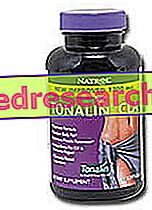LEVEMIR ® a drug based on insulin detemir
THERAPEUTIC GROUP: Insulin detemir for injectable use - insulins and analogues
IndicationsAction mechanismStudies and clinical effectiveness Usage and dosage instructionsWarnings Pregnancy and lactationInteractionsContraindicationsUndesirable effects

Directions LEVEMIR ® - Insulin detemir
LEVEMIR ® is indicated for the treatment of diabetic patients who need insulin therapy to restore a correct glycemic balance.
Mechanism of action LEVEMIR ® - Insulin detemir
LEVEMIR ® is a drug based on insulin detemir, an analogue of insulin obtained by replacing threonine in position B30 and associating lysine at position B29, a fatty acid with 14 carbon atoms known as myristic acid.
These two important variations respectively allow reversible binding of plasma albumin, making the activating action of the hormone on insulin receptors gradual and at the same time facilitating the formation of hexamers in the subcutaneous layer which delay the absorption of this insulin analogue.
These types of peculiarities make insulin detemir more stable from a pharmacokinetic point of view, significantly reducing intra and interindividual variations, and reproducing a more or less similar kinetics of action among the various patients, which can dose-extend the biological effect up to 24 hours after subcutaneous administration.
However, the important structural variations allow insulin detemir to mediate its hypoglycemic effect through the activation of insulin receptors expressed by insulin-sensitive tissues and at the same time inhibiting production and release of glucose from the liver, in a manner quite the same as it does the endogenous hormone.
Studies carried out and clinical efficacy
1. INSULIN DETEMIR IN PEDIATRIC AGE
Administration of insulin detemir in pediatric patients with type 1 diabetes mellitus ensured excellent glycemic control, reduced fasting glucose levels, reduced hypoglycemic events and reduced weight gain in short treatment periods. These results were decidedly better than those obtained with another insulin analogue and during intermediate such as isophane insulin.
2. EFFECTIVENESS OF THE DETEMIR INSULIN
Treatment with insulin detemir in patients with type II diabetes has proved particularly useful in ensuring a significant reduction in glycosylated hemoglobin, and fasting blood glucose, avoiding the weight gain observed following the administration of insulin glargine.
3. INSULIN THERAPY AND PONDERAL INCREASE
Weight gain is one of the most frequent manifestations in diabetic patients, which is often accentuated by the administration of insulin in the early stages of treatment. Among the various analogues, insulin detemir was able to determine the lowest weight gain. However, in these conditions it would be advisable to combine a healthy lifestyle and adequate nutrition.
Method of use and dosage
LEVEMIR ® 100 IU / ml insulin detemir for injection, 3 ml pre-filled pens:
the appropriate dosage of insulin detemir should be defined by the physician based on the type of therapy, the concomitant administration of other insulins, the physio-pathological condition of the patient and his glycemic concentrations.
In most cases, insulin detemir is taken once or twice a day subcutaneously via injections into the thigh, abdominal wall or deltoid.
The different area of administration affects the timing of drug absorption as is known.
Warnings LEVEMIR ® - Insulin detemir
The drug therapy with insulin, and in detail with insulin detemir, should include the active participation of the patient in order to maintain good glycemic control and avoid unpleasant side effects.
In fact, the patient must be adequately instructed on the correct methods of preservation, preparation and administration of the drug and must be able to promptly recognize the warning signs of hypoglycemia in such a way as to promptly resort to the remedies avoiding the onset of serious side reactions.
However, medical supervision is necessary throughout the therapeutic treatment with particular relevance in periods that may require therapeutic adjustment such as fever, infectious diseases, surgical interventions, changes in eating habits and lifestyle.
The possible onset of hypoglycemia could be accompanied by a significant decrease in the patient's perceptive capacities, making it dangerous to use machinery and drive vehicles.
PREGNANCY AND BREASTFEEDING
The recent marketing of insulin detemir has not been adequately preceded by studies and clinical trials able to evaluate the impact of this insulin analogue on the health of the fetus, when taken during pregnancy.
However, the safety profile on animal models was found to be excellent like the other analogues.
Interactions
Insulin detemir, like other analogues, can interact with different active ingredients by varying its pharmacokinetic properties.
In fact, the simultaneous intake of oral hypoglycemic agents, octreotide, anti-MAO, beta-blocking agents, ACE inhibitors, salicylates, alcohol and anabolic steroids could enhance the therapeutic effect of LEVEMIR ®, significantly increasing the risk of hypoglycemia.
On the contrary, the concomitant administration of oral contraceptives, thiazides, glucocorticoids, thyroid hormones and sympathomimetics could reduce the hypoglycemic effect of insulin detemir, requiring a possible adjustment of the dosage.
It is also useful to remember that sympatholytics can mask some important signs of hypoglycemia, increasing the risk of serious reactions.
Contraindications LEVEMIR ® - Insulin detemir
LEVEMIR ® contraindicated in case of hypoglycemia and hypersensitivity to human insulin or its excipients.
Undesirable effects - Side effects
Insulin detemir therapy has the same side effects as other insulin analogues.
As a result, redness, pain, edema and pruritus or lipoatrophy may occur at the injection site due to failure to change the injection site.
Systemic reactions such as breathing difficulties, edema and hypotension may be due to hypersensitivity to insulin or one of its excipients.
However the main adverse reaction described following insulin therapy is represented by hypoglycemia, which could manifest itself with pallor, cold sweat, tiredness, hypotension, drowsiness and which could lead in the most serious cases to loss of consciousness and coma.
Note
LEVEMIR ® salable only under medical prescription.
LEVEMIR ® is part of the doping class: hormones and related substances (prohibited in and out of competition)



